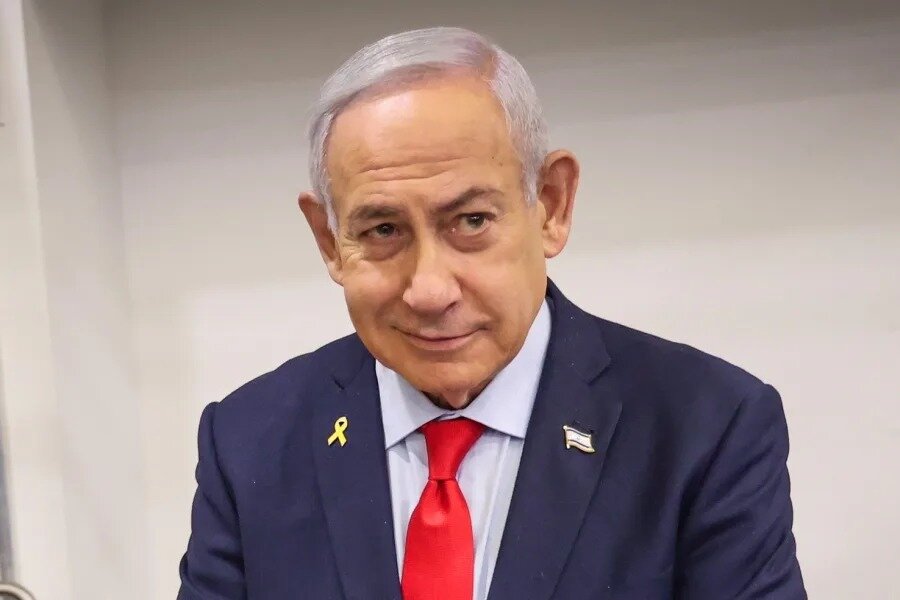Netanyahu praises Lebanese government!

BEIRUT — Lebanon is awaiting the return of US presidential envoy Thomas Barrack in coming days who will be carrying Tel Aviv’s response to the Lebanese government’s decision to implement the US-Israeli order to disarm the resistance movement.
Lebanon will also be visited by French envoy Jean-Yves Le Drian and Saudi envoy Yazid bin Farhan.
Meanwhile, Washington has expressed its grave “concern” over the continued tension on Lebanon’s southern border, claiming that Hezbollah’s “escalation” and repeated targeting of the occupied Palestinian territories “endangers the security of civilians (i.e. occupiers)”.
The US government’s principal Arabic-language spokesman called for restraint, saying: “These actions endanger civilians and threaten to drag the region into a broader confrontation,” while asserting Washington’s “support for Lebanon’s sovereignty and stability.”
Mitchell welcomed “the Lebanese government’s recent decision to begin implementing the cessation of hostilities agreement signed in November 2024, in addition to its commitment to Security Council Resolution 1701 and the Taif Agreement,” describing it as “a historic, courageous, and correct step toward implementing the principle of one army, one people, in one homeland.”
He added that these steps “represent a practical basis for the complete disarmament of Hezbollah,” considering that “taking concrete measures in this framework is essential to avoid the outbreak of a new war in the region.”
The U.S. spokesperson concluded by emphasizing “the continued coordination between Washington and its regional and international partners to support these efforts, consolidate calm, and prevent any further deterioration in the security situation in southern Lebanon.”
Nawaf Salam’s government’s recent provocative decision has become a key focus of Hebrew circles, given Tel Aviv’s significant importance to the Lebanese government’s decision, especially given what these circles point to as a significant Zionist role in creating the appropriate conditions for issuing this decision.
For his part, Israeli Prime Minister Benjamin Netanyahu announced that his colonial entity had assisted the Lebanese government in what he called “efforts to disarm Hezbollah.”
Netanyahu claimed in a press conference on Sunday that “what is currently happening in Lebanon is caused by Israel.”
Meanwhile, an opinion poll conducted by the Statistics and Opinion Polls Department at the Consulting Centre for Studies and Documentation (between July 27 and August 4) has revealed that the majority of Lebanese (58%) oppose harming the resistance’s weapons without a defensive strategy.
According to the Lebanese think-tank, this majority includes half of the Sunnis, about a third of the Christians, and even more Druze.
The sample numbers 600 respondents (54% male and 46% female), which have been randomly selected from all regions, sects, and age groups, with a margin of error of approximately 5%.
The percentage of Shiite and Sunni respondents in the sample has been equal (30%), compared to approximately 34% for Christians and 7% for Druze.
Approximately 72% of respondents have asserted that the Lebanese army alone is not capable of confronting any Israeli aggression; approximately 76% also believe that diplomacy alone is incapable of deterring aggression.
The survey reveals significant concerns among Lebanese, across all sects, about the existential threat posed by events in Syria to Lebanon.
The Ministry of Foreign Affairs, headed by a person from the Lebanese Forces, has ranked last when respondents were asked about trust in official Lebanese institutions.
In response to the question: “Do you support withdrawing the resistance’s weapons without a defense strategy,” 96% of Shiite respondents; 50% of Sunni respondents; 46% of Druze respondents; and 32% of Christians have answered “No”.
All sects have agreed to a large degree (92% of Shiites and 63.3% of other sects) that the army alone is incapable of confronting any Israeli aggression.
Respondents from all sects (to varying degrees) believe that diplomacy alone is incapable of deterring aggression. This has been confirmed by approximately 80% of Shiites, approximately 53% of Sunnis, 50% of Druze, and approximately 41% of Christians.
A high percentage of respondents believe that the events taking place in Syria pose an existential threat to Lebanon, and could threaten internal stability and pave the way for a war by militants against Lebanon.
A notable similarity observed between Shiite and Druze respondents has been attributed to recent events in the Druze-majority Syrian province of As-Suwayda.
88% of Shiites and more than 83% of Druze believe that the events in Syria pose a threat to Lebanon, compared to more than 68% of Christians and approximately 62% of Sunnis.
When respondents were asked about their confidence in official Lebanese institutions:
- the presidency has received medium to high confidence at approximately 67%;
- the prime minister at medium to high confidence at approximately 55%;
- parliament at approximately 50%;
- the judiciary at approximately 40%;
- the Ministry of Foreign Affairs (headed by Lebanese Forces minister) at approximately 38%.
Leave a Comment